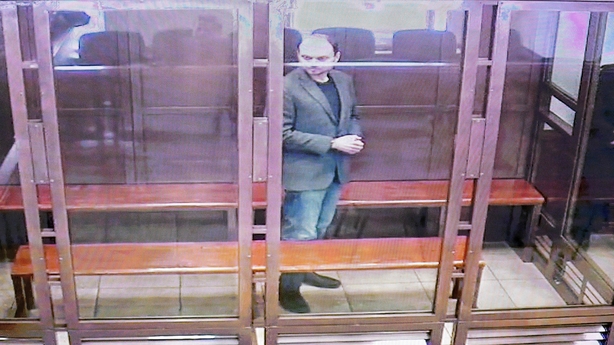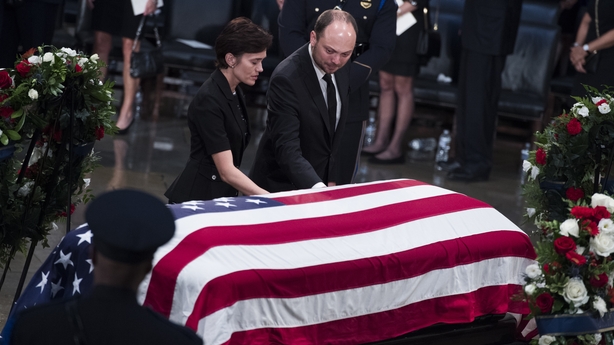Outspoken Kremlin critic Vladimir Kara-Murza was jailed for 25 years by a Moscow court after it found him guilty of treason and other offences he denied.
It is the harshest sentence of its kind since Russia invaded Ukraine.
Kara-Murza, 41, a father of three and an opposition politician who holds Russian and British passports, spent years speaking out against President Vladimir Putin.
He also lobbied Western governments to impose sanctions on Russia and individual Russians for purported human rights violations.
State prosecutors, who had requested the court jail him for 25 years, had accused him of treason and of discrediting the Russian military after he criticised what Moscow calls its "special military operation" in Ukraine.
In a CNN interview broadcast hours before he was arrested, Kara-Murza had alleged that Russia was being run by a "regime of murderers".
He had also used speeches in the US and across Europe to accuse Moscow of bombing civilian targets in Ukraine, a charge it has rejected.
In his final speech to the court last week, Kara-Murza had compared his own trial, which was held behind closed doors, to Josef Stalin's show trials in the 1930s.
He had declined to ask the court to acquit him, saying he stood by and was proud of everything he had said.
"Criminals are supposed to repent of what they have done. I, on the other hand, am in prison for my political views. I also know that the day will come when the darkness over our country will dissipate," he had said.

Shortly after sending tens of thousands of troops into Ukraine in February last year, Russia introduced sweeping wartime censorship laws which have been used to silence dissenting voices across society.
"Discrediting" the army can currently be punished by up to five years in prison, while spreading deliberately false information about it can attract a 15-year jail sentence.
At a time of what they have cast as an existential struggle with the West, pro-government politicians say unity across society is vital.
They have described Russian citizens questioning Moscow's actions in Ukraine as part of a pro-Western fifth column trying to undermine the military campaign.
Twice, in 2015 and 2017, Kara-Murza fell suddenly ill in what he said were poisonings by the Russian security services, on both occasions falling into a coma before eventually recovering.
Russian authorities denied involvement in the incidents. Kara-Murza's lawyers say that as a result, he suffers from as serious nerve disorder called polyneuropathy.

Kara-Murza was a close associate of Boris Nemtsov, a leading opposition figure who was assassinated near the Kremlin in 2015.
He was arrested in April 2022, hours after the CNN broadcast, and was declared a "foreign agent".
He was accused of spreading false information about the actions of the Russian military in Ukraine in connection with a speech he had given the previous month in the Arizona House of Representatives
He had said Mr Putin was "dropping cluster bombs on residential areas, mothers' homes, hospitals, and schools".
In July, he was additionally charged over his involvement with two foreign-based opposition forums that are labelled by the Russian state as "undesirable".
Finally, on 6 October, he was charged with treason over public speeches he had made in Lisbon, Helsinki and Washington.
The UK government has demanded Kara-Murza's immediate release.
The UK will continue "to call for Mr Kara-Murza's immediate release," said British Foreign Secretary James Cleverly, with his ministry summoning the Russian Ambassador in London, Andrey Kelin, over the case.
Germany also criticised the sentencing.
"We condemn this judgment in the strongest possible terms," a spokeswoman for the foreign office said.
The sentencing showed "the shocking level repression now reached in Russia".
Meanwhile, the United Nations human rights chief called on Moscow to free Kara-Murza.
"No one should be deprived of their liberty for exercising their human rights, and I call on the Russian authorities to release him without delay," said Volker Turk, UN High Commissioner for Human Rights in a statement.
He added that the sentence was "another blow to the rule of law and civic space in the Russian Federation".

